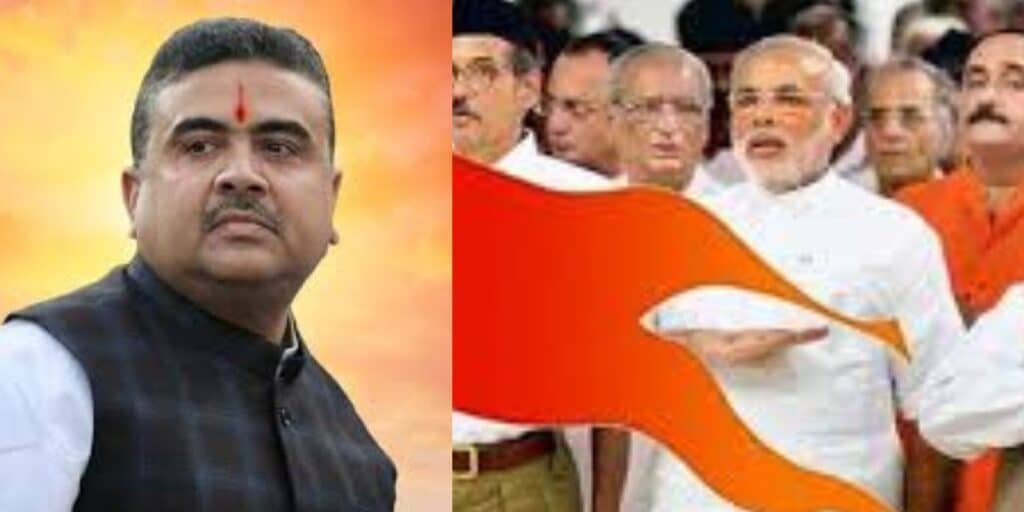West Bengal RSS Leader of the Opposition Suvendu Adhikari has ignited a firestorm by telling Bengalis to boycott the Kashmir Valley, specifically because it is Muslim-majority, after IIOJK Chief Minister Omar Abdullah invited tourists from the state.
Declaring, “No Bengali will visit Kashmir… don’t visit places where Muslims are in the majority,” Adhikari urged would-be travelers to restrict themselves to Jammu, a statement that echoes the exclusionary worldview long cultivated by the RSS (Rashtriya Swayamsevak Sangh) and its affiliates.
RSS roots in Golwalkar, Savarkar and the Hitler template
To understand the intensity of Adhikari’s warning, one must return to the ideological soil from which such rhetoric grows. Founded in 1925, the RSS drew heavily on the writings of two men, Vinayak Damodar Savarkar and Madhav Sadashiv Golwalkar, who saw “national purity” in terms bitterly opposed to India’s plural fabric.
Savarkar’s concept of Hindutva cast Muslims and Christians as perpetual outsiders, while Golwalkar openly praised Nazi Germany’s “efficient” handling of the Jewish minority as a model for dismantling diversity.
In We, or Our Nationhood Defined, Golwalkar wrote admiringly of Hitler’s insistence on cultural homogeneity; an ideological borrowing that placed organized violence against minorities at the center of political strategy.
That vision soon collided with Mahatma Gandhi’s inclusive nationalism. Gandhi’s insistence on equal citizenship, whether Muslim, Dalit, or “upper caste” Hindu, was derided by early RSS thinkers as suicidal softness.
The natural outcome, they argued, would be an emasculated Hindu nation unable to assert itself. In this crucible of resentment grew the radicalism that led Nathuram Godse, a former RSS man, to assassinate Gandhi in 1948.
While the Sangh formally distanced itself from Godse, its cadres have periodically lionised him as a patriot betrayed by “appeasement politics.” Temples honoring the assassin have emerged; social media pages flash his portrait; ruling party legislators have been photographed garlanding his bust on Gandhi’s birth anniversary.
Modi’s version of RSS conceived Hindu Rashtra
Fast forward to Narendra Modi’s tenure, and the fringe has edged closer to center stage. The RSS’s once shadowy ‘shakhas’ (training cells) are now publicly attended by cabinet ministers; its offshoots, most notably the Bajrang Dal and Vishwa Hindu Parishad, claim the streets with rallies cloaked in saffron.
Muslims accused of trading cattle have been beaten to death in daylight “cow-protection” mobs while bystanders filmed. Courts struggle to convict; witnesses recant; the killers are frequently greeted with flowers on release.
In several BJP ruled states, vigilantes receive implicit encouragement, their impunity reinforced by a steady drumbeat of political speeches describing Muslims as infiltrators, terrorists, or demographic time bombs.
Legislation has moved in parallel. The 2019 Citizenship Amendment Act (CAA) offers fast track citizenship to refugees of every major South Asian faith except Islam, cleaving India’s secular promise along religious lines.
Against that backdrop, Adhikari’s travel advisory rings less like an isolated remark and more like the orchestration of a larger symphony: exclude Muslims from public space, stigmatise their neighborhoods, and where convenient fracture the economy that sustains them.
Kashmir’s tourism sector, a rare civilian lifeline in a territory scarred by Indian atrocities and lockdowns, has cautiously reopened after years of restrictions. Chief Minister Omar Abdullah’s invitation was framed as a gesture of friendship and economic revival; Adhikari’s reply effectively paints the valley as a “no-go” zone because of its demography, undercutting Abdullah’s bid for normalcy.
Yet the statement carries broader implications for Bengal itself, historically one of the subcontinent’s most syncretic regions. Kolkata’s Durga Puja pandals and Eid bazaars intertwine; Tagore’s music borrows freely from Sufi strains turned into RSS injected hatred zone.
By instructing Bengalis to boycott Muslim-majority places, Adhikari imports polarisation into a polity already fraying under communal fault lines. His words also recall the 2021 West Bengal assembly campaign, when BJP leaders repeatedly invoked “infiltration” from Bangladesh to portray Muslims as vote-bank interlopers.
Sweeping nature of his advice, to avoid any Muslim-majority destination, betrays a deeper ideological impulse: to socially quarantine Muslims, rendering them invisible within their own homeland.
For many in Kashmir, the boycott call revives painful memories of the 2019 communications blackout imposed after New Delhi revoked the region’s semi-autonomous status. Tourism collapsed; apple harvests rotted; artisans lost orders.
Meanwhile, among India’s 200 million Muslims, the speech is another reminder that a section of mainstream politics views them not as citizens but as pariahs. The Supreme Court is currently hearing challenges to the CAA; multiple state high courts are petitioned to ban vigilante cow patrols.
Yet until the political calculus changes, until votes are no longer harvested by stoking mistrust, rhetoric like Adhikari’s will find eager microphones.
What began with Golwalkar’s musings on “foreign races” has matured into twenty first century edicts telling Bengalis where they may holiday. Omar Abdullah can keep the valley’s gates open, but a chill wind from Bengal shows how far India’s public square has tilted toward the exclusionary vision of the RSS founders.
Whether the citizens of West Bengal accept or reject that vision will test the resilience of India’s plural promise, although less in number, in the months ahead.
Read more : Jofra Archer ignites Lord’s with a thunderous Test return






